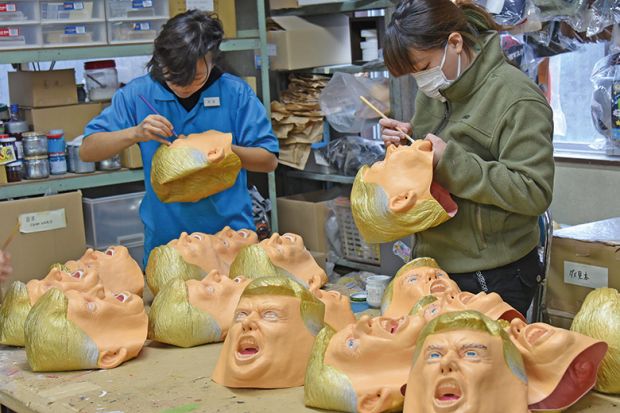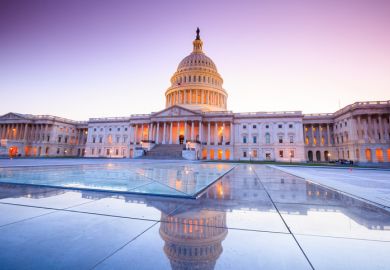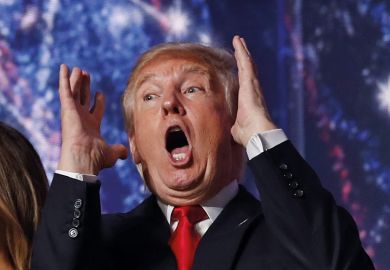The rise of Donald Trump proved traumatic for many academics. But it has also opened up a fruitful line of research into the US president’s personality and style, suggesting that the rise of Trump is being followed swiftly by the rise of Trump studies.
The plethora of journal articles now starting to be published go well beyond scholarship on the success of populism worldwide, or traditional political studies, with some startling findings.
One paper, “Harry Potter and the Deathly Donald”, suggested that reading about J. K. Rowling’s young wizard might have inoculated the American electorate to Mr Trump’s brand of populism. Many others put the Republican’s communication style centre-stage.
In the Journal of Ethnographic Theory, for example, Donna M. Goldstein, director of the Latin American Studies Center at the University of Colorado Boulder, and others consider “The hands of Donald Trump: entertainment, gesture, spectacle”, exploring how the “exaggerated depictions of the sociopolitical world that [Mr] Trump crafts with his hands to oppose political correctness and disarm adversaries accrue visual capital in a mediatised 21st-century politics that is celebrity driven”. A paper in Personality and Individual Differences by Delroy L. Paulhus, professor of psychology at the University of British Columbia, and others, is devoted to “Explaining Donald Trump via communication style: grandiosity, informality and dynamism”.
There are some obvious questions about such approaches. How far are they motivated by the political and often visceral dislike that many academics feel for Donald Trump, which may also lead researchers to overemphasise personal “style” at the expense of deeper factors?
Brian L. Ott, professor of communication studies at Texas Tech University, has already published a paper called “The age of Twitter: Donald J. Trump and the politics of debasement” for Critical Studies in Media Communication and is now looking at how Trump’s rhetorical style functions as a way of “performing white rage”.
He admitted that he thinks “Trump’s rhetoric poses a grave threat to American democracy” and that his research is partly “a political intervention”, although he emphasised that it was “not simply based on my subjective, impressionistic responses”.
Martin Obschonka, associate professor in entrepreneurship at Queensland University of Technology, has just published a co-authored paper in Small Business Economics, “Entrepreneurial personalities in political leadership”, which uses Trump’s Twitter feed to demonstrate that the president “shows comparatively high levels [of] neuroticism, and underlying low well-being” compared with other business leaders. He denied that he was motivated by “political concerns” and stressed that they used “a highly objective and neutral perspective”.
Perhaps the strangest recent intervention is a paper in the Journal of Future Studies by Victor MacGill, a research student at the University of the Sunshine Coast, New Zealand, titled “The Rule of the Jester King”. This uses a fairytale format, complete with “magic spells, evil wizards, and demon hordes”, to explore the possible results of a Trump presidency. Three scenarios amount to business as usual, significant economic growth or total collapse. Fortunately, the final option foresees “a magical fairy [flying] over the kingdom of Cemaria [America] sprinkling the dusk of illumination as she went”.
POSTSCRIPT:
Print headline: Trump studies seeks answers
Register to continue
Why register?
- Registration is free and only takes a moment
- Once registered, you can read 3 articles a month
- Sign up for our newsletter
Subscribe
Or subscribe for unlimited access to:
- Unlimited access to news, views, insights & reviews
- Digital editions
- Digital access to THE’s university and college rankings analysis
Already registered or a current subscriber?










